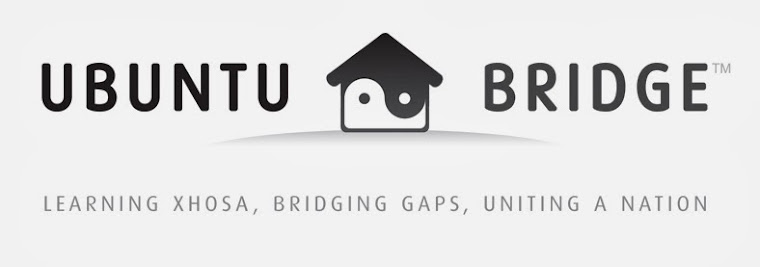Hey guys
I have been giving a number of presentations over the years, but never really marketed it. I speak to corporates, schools, students, whoever. Always fun, informative, interactive and a little bit funny ;) I give very flexible talks, specific to the occasion, and can use audio-visual elements, or just speaking, but either way, the talk is inspiring, empowering and entertaining. Please email craig at learnxhosa dot co dot za for more info. In the meanwhile, please see feedback below, or watch my recent TEDx talk to a group of 350 educators live. Video further up in this blog.
Yhu! Enkosi kakhulu! Craig,
that was terrific! I am only sorry you weren't a fly on the wall in my lesson
after to hear the boys bubbling over. You made a massive impression - all
positive too! You have extended your fan base and really made these boys think
and feel. They are all adamant that you should be a permanent fixture on the Gr
7 school calendar - a compliment indeed!
Lisa Harris, Head of
isiXhosa WPPS
Thank you SO much for coming
in- your talk was inspiring, thought-provoking and so
well received by everyone. It sparked a lot of interest and really got
people thinking and talking. Some
feedback from the group:
"It inspired me and
really opened my eyes. I learnt a lot."
"Inspiring,
intelligent, ingenious." People
took to it incredibly well.
Nina Bloch, Westerford High
Hey, you are a definite hit…
- and trust me, there is no more sincere and honest flattery than that from
13-year-olds when it is spontaneous! You
pitched your talk perfectly and had something in it to appeal to each of the
boys at a variety of levels. Most of all, your enthusiasm, knowledge, humour
and genuine engagement has inspired the boys. (Gives me hope for the future of
SA!) Unquestionably, the vids help.
Lisa Harris, Western Province Prep School
Charismatic, talented and doing
something really important, Craig should be working in every school in the
country!
Georgina Stirrup, Accelerate Cape Town
Craig it was an awesome
presentation, The boys are still talking about it and I truly believe you motivated
some guys to do something about learning an African language." Tim
Stirrup, Head of Lingua Franca society, Bishops
I watched your TEDxED video
again last night – INSPIRATIONAL stuff. Thanks again for putting in so much
effort. Of the 60 audience feedback forms I’ve got most rated your and Xola’s
talks as their top favourites. Well done!
Terence Themba Berry, TedX
Education Organiser
What I liked personally was
for someone other than myself saying how important and valuable learning
another language like Xhosa can be. I just wish more pupils would take it as a
subject. It was interesting to hear your background and your journey and about
the making of the video. Thanks for promoting the language because it is an
uphill battle, especially as it has lost even more status in primary schools
because it falls outside the "core" subjects which pupils are forced
to take. I hope you will continue to
inspire others to make an effort so that they and our country can benefit!
Cuan Dugmore, Head of Xhosa, Westerford High
Thanks for an excellent
presentation. There was an excellent
opportunity for young men at Bishops who are mostly from a privileged
background to witness first-hand how an OD has broken with convention and
embraced another culture thus reaching out in a truly South African way in the
broadest sense of the word. Paul Murray, History Teacher
Thank you so much for your
wonderful presentation and that you were willing to be one of our speakers at
the Pecha Kucha event. Judging by our audience response, you were one of the
favourites!
Ronnie Belcher, Pecha Kucha Cape Town
Craig Charnock was one of our
speakers at our PechaKucha Night here in Cape Town in June 2011. This
international event ( http://www.pecha-kucha.org/ ) is hosted in over 417
cities worldwide and is a platform created to inspire others. Craig was a
brilliant speaker, who totally captivated the audience. His passion was
contagious. When the audience participated in vocalising the three xhosa
clicks, they were totally engaged. Fantastic. Thanks, Dave Cotton, www.pechakuchacapetown.co.za
Your presentation at TEDx -
other than being engaging and powerful - was personally encouraging to me and
gave me some good quotes and evidence to continue the promotion of Xhosa
teaching at our school - as with CAPS next year this could be an optional extra
at primary school level.
Kind regards, Colleen Moore
“The stories you shared with
the group about your journey with African traditional medicine were captivating
and inspiring. Thank you!”
Stewart Chirova
Academic Director, South Africa: Multiculturalism and
Human Rights
“Craig, your contribution to
the programme was simply stunning and I only wish we had more time to do
justice to your input. Just watching their body language as you spoke - from the heart -
conveyed to me their interest - you came over exceptionally well. With warm
regards”
Trevor
Wilkins, Organizer - Rotary
Ambassadorial Orientation - 2006












